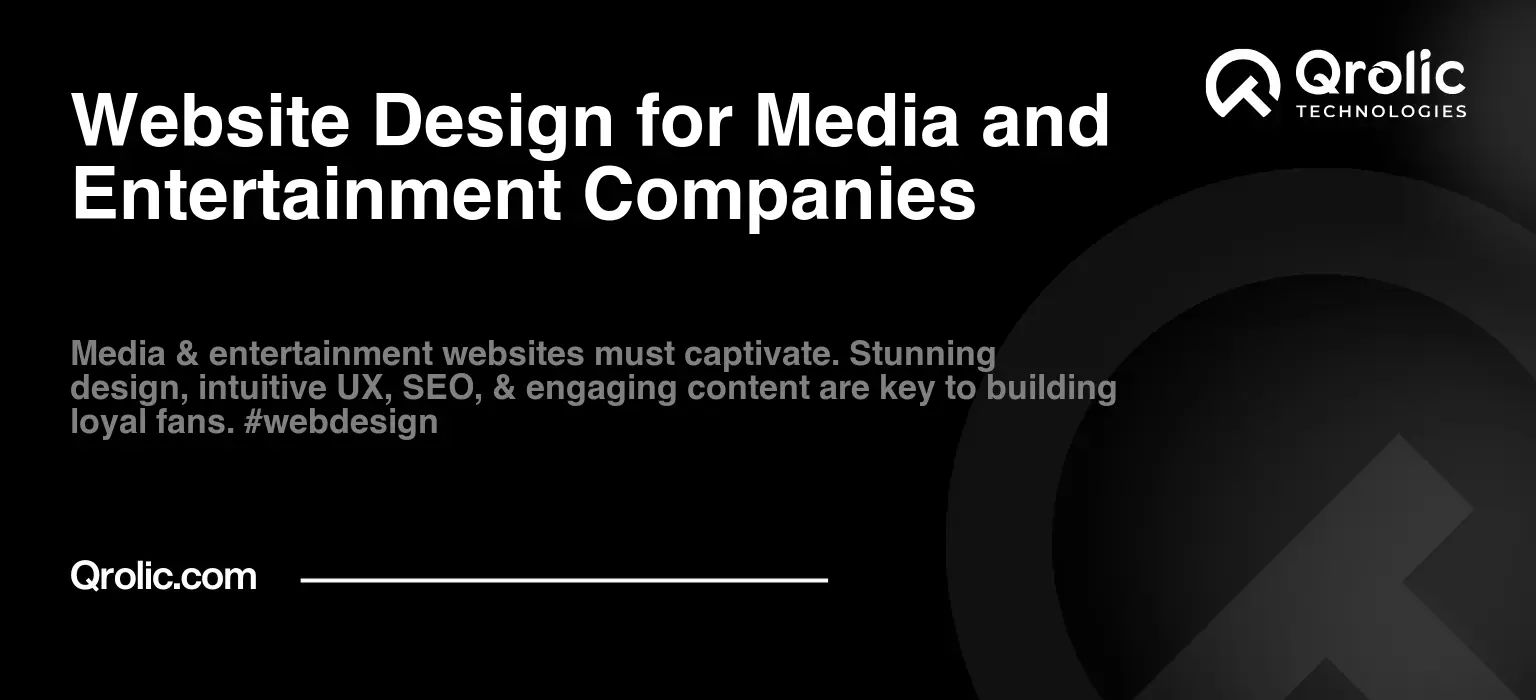Quick Summary:
- Your website is vital for media and entertainment success.
- Focus on stunning visuals, easy navigation, and engaging content.
- Optimize for SEO, social, and accessibility to reach more.
- Consider expert help for advanced features and ongoing support.
Table of Contents
- Lights, Camera, Website! Why Stellar Web Design is Non-Negotiable for Media & Entertainment
- The Stakes Are High: More Than Just an Online Brochure
- The “Why” Behind the “Wow”: Key Benefits of Exceptional Website Design
- Decoding the Digital Landscape: Key Elements of a Winning Media & Entertainment Website
- 1. Visually Stunning Design: Captivating Attention from the First Click
- 2. Intuitive Navigation: Guiding Users on Their Journey
- 3. Engaging Content: Telling Your Story and Building Connection
- 4. Call to Actions (CTAs): Guiding Users Towards Conversion
- 5. SEO Optimization: Increasing Visibility and Driving Traffic
- 6. Social Media Integration: Amplifying Your Reach and Engagement
- 7. Accessibility: Ensuring Inclusivity for All Users
- 8. Analytics and Tracking: Measuring Performance and Optimizing Results
- Case Studies: Examples of Outstanding Media & Entertainment Website Design
- Actionable Steps: Building Your Own Media & Entertainment Website
- Don’t Go It Alone: When to Partner with a Web Development Agency
- Qrolic Technologies: Your Partner in Digital Transformation
- Why Choose Qrolic Technologies?
- Our Services
- Let’s Build Something Amazing Together
- The Future of Media & Entertainment Websites: Trends to Watch
- Conclusion: Your Website – The Epicenter of Your Media Empire
Lights, Camera, Website! Why Stellar Web Design is Non-Negotiable for Media & Entertainment
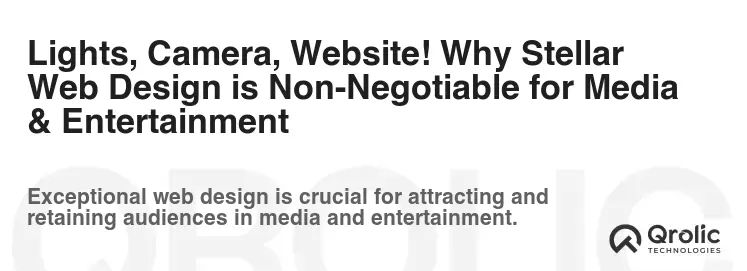
The media and entertainment (M&E) landscape is a roaring river of content, a constant deluge of movies, music, games, news, and experiences battling for attention. In this sensory overload, a compelling website isn’t just an asset; it’s a lifeline. It’s the digital stage where you command the spotlight, the virtual venue where your audience gathers, and the interactive platform where stories truly come alive.
The Stakes Are High: More Than Just an Online Brochure
Gone are the days when a website was a simple online brochure. For M&E companies, it’s the primary point of contact, often the first impression potential customers have of your brand. A poorly designed website can kill interest instantly, leaving a lingering sense of amateurism and a missed opportunity to connect.
Consider this: a potential moviegoer searches for showtimes. They land on a film studio’s website that’s slow, clunky, and difficult to navigate. Frustration mounts. They quickly abandon the site and head to a competitor or a third-party ticketing platform. The studio loses a sale, and more importantly, loses engagement.
A well-crafted website, however, is a magnet. It draws users in, keeps them engaged, and turns casual browsers into devoted fans. It’s about creating an immersive, intuitive, and memorable experience that reflects the quality and artistry of your content.
The “Why” Behind the “Wow”: Key Benefits of Exceptional Website Design
Investing in top-tier website design for your media or entertainment company isn’t just about aesthetics. It’s a strategic move that pays dividends across multiple fronts:
- Enhanced Brand Identity: Your website is an extension of your brand. A consistent design language across all platforms reinforces brand recognition and helps solidify your company’s image in the minds of your audience. It communicates your values, your personality, and your unique selling proposition.
- Improved User Experience (UX): A user-friendly website is intuitive, easy to navigate, and provides a seamless experience for visitors. This leads to higher engagement, lower bounce rates, and increased time spent on the site. Think clear calls to action, logical site architecture, and mobile responsiveness.
- Increased Engagement and Conversion: Engaging content, interactive elements, and strategic calls to action can convert website visitors into paying customers, subscribers, or dedicated fans. Think ticketing integration, streaming previews, merchandise sales, and email sign-ups.
- Better SEO Performance: A well-optimized website is more likely to rank higher in search engine results pages (SERPs). This means more organic traffic, increased visibility, and a wider reach for your content. Think keyword research, optimized meta descriptions, and a mobile-first design.
- Stronger Audience Connection: A website can serve as a central hub for communication and interaction with your audience. Think forums, comment sections, social media integration, and personalized content recommendations.
- Data-Driven Insights: Website analytics provide valuable insights into user behavior, allowing you to track performance, identify areas for improvement, and make data-driven decisions about content strategy and marketing campaigns.
Decoding the Digital Landscape: Key Elements of a Winning Media & Entertainment Website
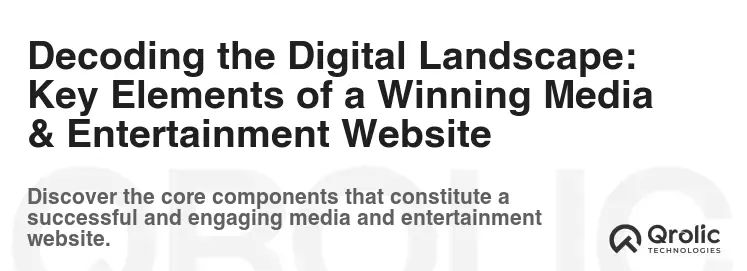
Now that we’ve established the “why,” let’s dive into the “what.” What are the essential elements that make a website truly shine in the competitive media and entertainment arena?
1. Visually Stunning Design: Captivating Attention from the First Click
In the world of visual storytelling, aesthetics are paramount. Your website design should be captivating, reflecting the quality and style of your content.
- High-Quality Imagery and Video: Use professional-grade photos and videos to showcase your work. Optimize images for web use to ensure fast loading times without sacrificing visual appeal.
- Compelling Visual Hierarchy: Guide the user’s eye with a clear visual hierarchy. Use contrasting colors, strategic placement of elements, and appropriate font sizes to highlight key information.
- Consistent Branding: Maintain a consistent brand identity across all pages, including logos, color palettes, typography, and imagery.
- Interactive Elements: Incorporate interactive elements such as animations, parallax scrolling, and micro-interactions to enhance user engagement and create a more dynamic experience.
Example: Imagine a website for a video game company. The homepage features a stunning animated background showcasing gameplay footage, accompanied by a bold headline and a prominent “Buy Now” button. The color scheme matches the game’s aesthetic, and the navigation is intuitive and easy to use.
2. Intuitive Navigation: Guiding Users on Their Journey
A confusing website is a frustrating website. Your website should be easy to navigate, allowing users to quickly find what they’re looking for.
- Clear and Concise Menu Structure: Use a simple and logical menu structure that categorizes content in a way that makes sense to users.
- Search Functionality: Implement a robust search function that allows users to quickly find specific content.
- Breadcrumb Navigation: Provide breadcrumb navigation to help users understand their location within the website and easily navigate back to previous pages.
- Mobile-First Design: Ensure your website is fully responsive and optimized for mobile devices. The majority of users access websites on their smartphones or tablets.
Example: A music streaming service’s website might feature a menu with categories like “New Releases,” “Genres,” “Artists,” “Playlists,” and “My Library.” Each category leads to a dedicated page with relevant content. A prominent search bar allows users to quickly find specific songs, albums, or artists.
3. Engaging Content: Telling Your Story and Building Connection
Content is king, especially in the media and entertainment industry. Your website should showcase your content in a way that is both informative and engaging.
- High-Quality Writing: Use clear, concise, and engaging language to communicate your message.
- Compelling Storytelling: Tell the story behind your content, whether it’s a movie, a song, a game, or a news article.
- Multimedia Integration: Incorporate a variety of multimedia elements, such as videos, audio clips, and images, to enhance the user experience.
- Regular Updates: Keep your website fresh and up-to-date with new content on a regular basis.
Example: A film production company’s website could feature behind-the-scenes videos, interviews with the cast and crew, trailers, and synopses of their films. They could also include a blog with articles about filmmaking and the entertainment industry.
4. Call to Actions (CTAs): Guiding Users Towards Conversion
A well-designed website should guide users towards specific actions, such as making a purchase, subscribing to a newsletter, or contacting your company.
- Clear and Concise Language: Use clear and concise language in your CTAs, such as “Buy Now,” “Subscribe,” “Learn More,” or “Contact Us.”
- Strategic Placement: Place CTAs in prominent locations on your website, such as above the fold, within content, and at the end of pages.
- Visually Appealing Design: Make your CTAs visually appealing by using contrasting colors, bold typography, and eye-catching graphics.
Example: A video game developer’s website could feature a prominent “Buy Now” button on the game’s landing page, along with a “Join Our Community” button to encourage users to sign up for their forum.
5. SEO Optimization: Increasing Visibility and Driving Traffic
Search engine optimization (SEO) is crucial for driving organic traffic to your website.
- Keyword Research: Identify relevant keywords that your target audience is searching for. Tools like Google Keyword Planner and Ahrefs can help. (Keywords: media company website design, entertainment web development, content website design)
- On-Page Optimization: Optimize your website’s content, meta descriptions, and title tags with relevant keywords.
- Off-Page Optimization: Build high-quality backlinks from other reputable websites in the media and entertainment industry.
- Technical SEO: Ensure your website is technically sound, with fast loading times, mobile responsiveness, and a clear site architecture.
Example: A news website could optimize its articles with relevant keywords related to current events and trending topics. They could also build backlinks from other news sources and media outlets.
6. Social Media Integration: Amplifying Your Reach and Engagement
Integrate your website with your social media channels to amplify your reach and engagement.
- Social Sharing Buttons: Make it easy for users to share your content on social media platforms.
- Social Media Feeds: Display your latest social media posts on your website to keep users up-to-date.
- Social Login: Allow users to log in to your website using their social media accounts.
Example: A music artist’s website could feature social sharing buttons on each song page, allowing fans to easily share their favorite tracks on social media. They could also display their latest tweets and Instagram posts on the homepage.
7. Accessibility: Ensuring Inclusivity for All Users
Ensure your website is accessible to all users, including those with disabilities.
- Alt Text for Images: Provide descriptive alt text for all images.
- Keyboard Navigation: Ensure your website can be navigated using a keyboard.
- Sufficient Color Contrast: Use sufficient color contrast between text and background.
- Captions for Videos: Provide captions for all videos.
Example: A movie studio’s website should provide captions for all trailers and behind-the-scenes videos, as well as alt text for all images on the site.
8. Analytics and Tracking: Measuring Performance and Optimizing Results
Implement website analytics tools to track performance, identify areas for improvement, and optimize your website for better results.
- Google Analytics: Use Google Analytics to track website traffic, user behavior, and conversion rates.
- Heatmaps: Use heatmaps to see how users are interacting with your website.
- A/B Testing: Use A/B testing to experiment with different designs and content to see what works best.
Example: A gaming company can track the number of downloads of their games from their website, the time spent on each page, and the conversion rate of visitors who purchase the game. They can then use this data to optimize their website and improve their marketing campaigns.
Case Studies: Examples of Outstanding Media & Entertainment Website Design
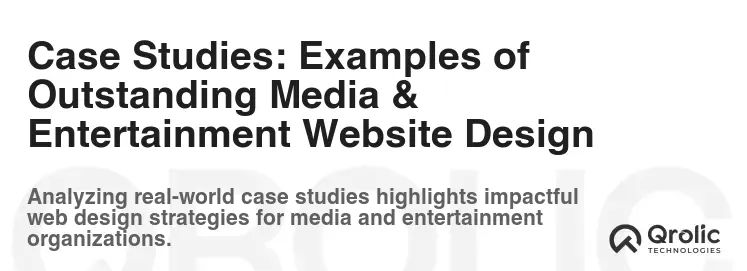
Let’s examine some real-world examples of media and entertainment companies that have nailed their website design:
- Netflix: Netflix boasts a clean, intuitive interface that prioritizes visual content. Their recommendation engine is highly effective, and their user experience is seamless across all devices.
- Spotify: Spotify’s website is visually appealing and easy to navigate. Their music discovery features are excellent, and their social media integration is seamless.
- Marvel: Marvel’s website is a visual feast, showcasing their vast universe of characters and stories. Their website is packed with engaging content, including trailers, comics, and news articles.
- The New York Times: The New York Times’ website is a masterclass in news design. Their website is easy to navigate, and their content is well-organized and visually appealing.
These companies demonstrate the power of a well-designed website to enhance brand identity, improve user experience, and drive engagement.
Actionable Steps: Building Your Own Media & Entertainment Website
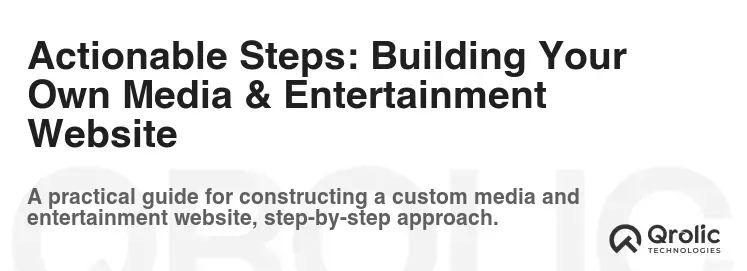
Ready to transform your online presence? Here are some actionable steps to get you started:
- Define Your Goals: What do you want to achieve with your website? Increase brand awareness? Generate leads? Sell products?
- Identify Your Target Audience: Who are you trying to reach? What are their needs and interests?
- Conduct Keyword Research: Identify the keywords that your target audience is searching for.
- Choose a Domain Name: Select a domain name that is relevant to your brand and easy to remember.
- Choose a Web Hosting Provider: Select a web hosting provider that is reliable and affordable.
- Select a Website Platform: Choose a website platform that is easy to use and customizable, such as WordPress, Wix, or Squarespace.
- Design Your Website: Create a visually appealing and user-friendly website design.
- Develop Your Content: Create high-quality content that is engaging and informative.
- Optimize Your Website for SEO: Optimize your website for search engines.
- Promote Your Website: Promote your website through social media, email marketing, and other channels.
- Track Your Results: Track your website’s performance and make adjustments as needed.
Don’t Go It Alone: When to Partner with a Web Development Agency

While building a website yourself is possible, especially with user-friendly platforms, the complexities of the media and entertainment industry often demand the expertise of a professional web development agency. Here’s when it makes sense to bring in the pros:
- Complex Functionality: If your website requires advanced features such as streaming integration, ticketing systems, or custom content management systems, a development agency can provide the technical expertise to bring your vision to life.
- Custom Design Needs: If you want a unique and highly customized website design that truly reflects your brand, a design agency can create a bespoke solution tailored to your specific needs.
- SEO Expertise: A web development agency with SEO expertise can help you optimize your website for search engines and drive organic traffic.
- Ongoing Maintenance and Support: A web development agency can provide ongoing maintenance and support to ensure your website is always up-to-date and running smoothly.
- Lack of Time or Resources: If you don’t have the time or resources to dedicate to building and maintaining your website, a development agency can handle everything for you.
Qrolic Technologies: Your Partner in Digital Transformation

At Qrolic Technologies (https://qrolic.com/), we understand the unique challenges and opportunities facing media and entertainment companies in the digital age. We offer a comprehensive suite of web development services tailored to meet the specific needs of the industry.
Why Choose Qrolic Technologies?
- Deep Industry Expertise: We have a proven track record of success in developing websites for media and entertainment companies of all sizes.
- Custom Solutions: We don’t believe in one-size-fits-all solutions. We work closely with our clients to understand their specific needs and develop customized websites that meet their unique requirements.
- Cutting-Edge Technology: We use the latest technologies to create websites that are fast, secure, and scalable.
- Dedicated Support: We provide ongoing maintenance and support to ensure your website is always up-to-date and running smoothly.
- Results-Driven Approach: We are committed to delivering results that exceed our clients’ expectations.
Our Services
We offer a wide range of web development services, including:
- Website Design and Development: We create visually stunning and user-friendly websites that are tailored to your brand and target audience.
- Content Management System (CMS) Development: We develop custom CMS solutions that allow you to easily manage your website content.
- E-commerce Development: We develop e-commerce websites that allow you to sell your products and services online.
- SEO Optimization: We optimize your website for search engines to drive organic traffic.
- Mobile App Development: We develop mobile apps that allow you to reach your audience on the go.
Let’s Build Something Amazing Together
If you’re looking for a partner to help you build a world-class website for your media or entertainment company, we invite you to contact us at Qrolic Technologies (https://qrolic.com/). We’d love to learn more about your business and discuss how we can help you achieve your goals.
The Future of Media & Entertainment Websites: Trends to Watch
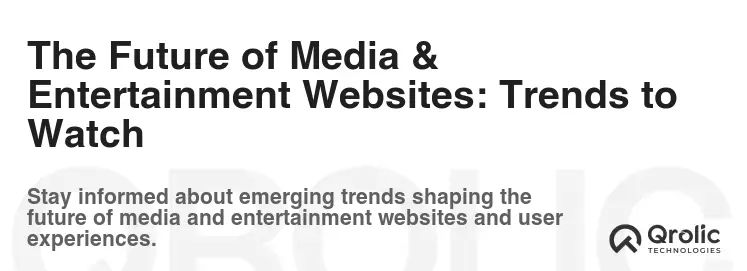
The digital landscape is constantly evolving, and the media and entertainment industry is at the forefront of innovation. Here are some key trends to watch in the coming years:
- Personalization: Websites will become increasingly personalized, tailoring content and experiences to individual users based on their preferences and behavior.
- Artificial Intelligence (AI): AI will play a greater role in website design and development, powering features such as chatbots, content recommendations, and automated testing.
- Virtual Reality (VR) and Augmented Reality (AR): VR and AR will create immersive experiences for users, blurring the line between the physical and digital worlds.
- Blockchain Technology: Blockchain technology will enable new ways to monetize content and protect intellectual property.
- Voice Search Optimization: Websites will need to be optimized for voice search as more users rely on voice assistants to access information.
By staying ahead of these trends, media and entertainment companies can ensure their websites remain relevant and engaging for years to come.
Conclusion: Your Website – The Epicenter of Your Media Empire
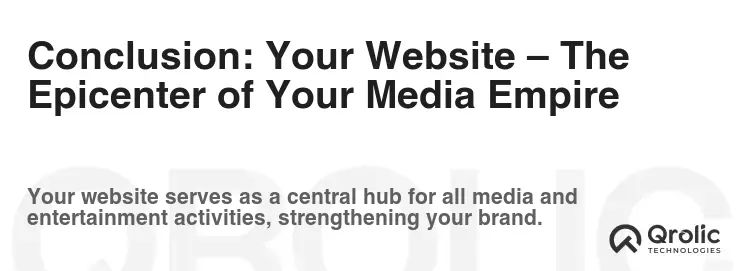
In the dynamic realm of media and entertainment, your website is more than just a digital storefront; it’s the pulsating heart of your brand, the interactive canvas where stories unfold, and the central hub connecting you with your audience. A meticulously designed website isn’t a luxury; it’s an absolute necessity for survival and success.
By embracing the principles outlined in this comprehensive guide – prioritizing visual appeal, ensuring intuitive navigation, crafting engaging content, optimizing for search engines, and embracing accessibility – you can create a website that not only attracts visitors but also captivates them, converts them into loyal fans, and ultimately, elevates your brand to new heights.
Remember, your website is an ever-evolving entity. Continuously monitor its performance, adapt to emerging trends, and never stop striving to create a more engaging and enriching experience for your audience. With dedication and a strategic approach, your website can become the epicenter of your media empire, the go-to destination for your target audience, and the driving force behind your continued success in the vibrant world of media and entertainment. So, take the spotlight, command the stage, and let your website tell your story to the world.
